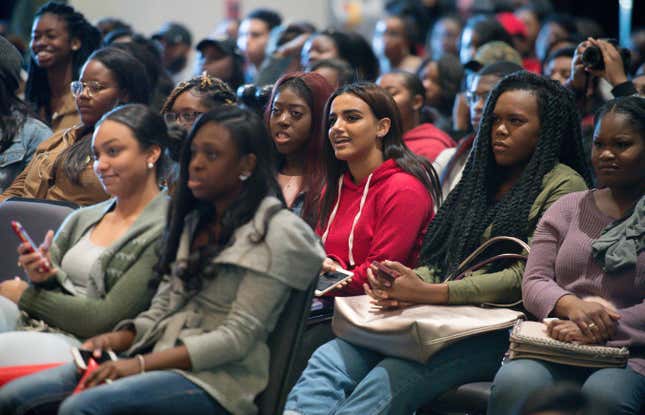
According to the U.S. Department of Education, there are currently 107 historically black colleges in the United States serving more than 228,000 students. If you’ve ever attended one or have close family or friends who have, you know the lasting impact the experience of being an HBCU student has on black people and how it can shape them.
“It was a melting pot of high intelligence and backgrounds,” 51-year-old Darrell Dial, a molecular genomics scientist told NBC News about his experience at South Carolina State University‚ which he entered in 1987. “This black diversity made a great playground for great debate and banter. It was truly iron sharpening iron for us all. I wouldn’t be the man I am if it weren’t for South Carolina State.”
Apparently, testimonies like Dial’s need to be heard by black folk around the nation, especially those currently or soon to be getting ready to apply to colleges, because HBCUs are experiencing an alarming decline in enrollments, dropping down to the second-lowest rate in 17 years, according to NBC.
According to the National Center for Educational Statistics, more than 6,000 fewer students attended the 101 black colleges and universities in the U.S. during the 2018-19 school year. The 291,767 total was down from the 298,134 in the previous year, and was the lowest total since 2001, when there were 289,985 students at historically black colleges.
An enrollment decline of less than 7,000 may not seem like much, but those numbers continuing to drop threatens the very survival of some black institutions of higher learning.
“There is a distinct possibility that a number of HBCUs could cease to exist in 20 years or so,” retired Army colonel and graduate from Norfolk State University Ronnie Bagley told NBC. “If that were to occur, many low-income, first-generation students will lose out on an opportunity for a college education.
“That’s scary because HBCUs have been the bedrock of producing some of the most successful and influential contributors in all facets of society, including business, government, military, arts and entertainment. You name it.”
Bagley cites PWI’s having better funding as part of the problem saying, “In many cases predominantly white institutions are looking to become more diverse by offering minorities scholarships. While I wanted my children to follow in my footsteps and attend an HBCU—preferably my alma mater—the HBCUs we visited couldn’t offer the kind of money the University of Kentucky did.”
This new report comes at a time when America’s first black university, Cheyney University (founded in 1837 as Cheyney State College), is on the verge of being forced to close its doors having experienced a 38 percent drop in its student body in 2018, sending the university into financial despair.
Bethune-Cookman College president Brent Chrite has also watched enrollment at his Daytona Beach school drop by 20 percent prompting him to send a letter to the college’s alumni on Jan. 27.
“2020 will be a pivotal year in history of B-CU,” Chrite wrote. “It will be the year our beloved university prepared to close its doors, or it will be the year we turned a corner and began moving toward an exciting future.”
B-CU is currently suffering under an $8 million operating deficit and will lose more than $17 million in federal funding if it can’t eliminate the deficit by the time it submits its re-accreditation application this month as required by the Southern Association of Colleges and Schools Commission on Colleges.
“We cannot survive as a university without it,” Chrite wrote.
The NCES study doesn’t explain exactly what the cause is of the drop in HBCU attendance but does list several factors that may be responsible. From NBC News:
HBCUs lost $50 million when the Department of Education made it more difficult to acquire the PLUS Loan that many schools relied on, according to The Edvocate, which researches educational trends, issues and futures.
HBCU retention rates—keeping students in school year after year—are lower than predominantly white institutions. A U.S. News study indicates Spelman College leads HBCUs with an 88 percent retention rate, but many other schools drop as low as 50 percent because of financial issues and schools’ inadequate inducements for students to continue their education.
The explosive appeal of online colleges like DeVry and the University of Phoenix has hit HBCUs hard, according to The Edvocate. HBCUs had been considered a prime place for challenged or “underdog” students, but online options are trending because they are less expensive. Compounding matters, most HBCUs have not implemented thorough online classes or degree programs.
Investment in some campuses and facilities, like at Norfolk State and North Carolina A&T, has been impressive. But the lack of contemporary technology and building upkeep at many HBCUs — like at Tennessee State, where enrollment has dipped for 10 straight years — has turned away black students.
Whether the reason for the enrollment decline is due to misconceptions about the level of education attainable at these institutions, funding issues, the cost of tuition or other factors, perhaps black students applying for college will be inspired to raise HBCU attendance numbers after hearing testimonies like that of Elaine Brown, a radiologist in San Antonio, who turned down a full scholarship to the University of Louisville’s Medical School to attend Meharry Medical College as well as Fisk University in Nashville (both HBCUs) so that she could have the black college experience.
“My parents thought I was crazy,” she said. “But it was not just about the education, but the social aspect as well. When I’m with HBCU alums and others who did not attend an HBCU, they don’t understand the effervescence we have when talking about our experiences. ... I visited Fisk during my senior year of high school and I never looked back. It was a loving, nurturing, safe space. Sadly, a lot of young people perceive that there is more opportunity and promise at larger institutions.”

